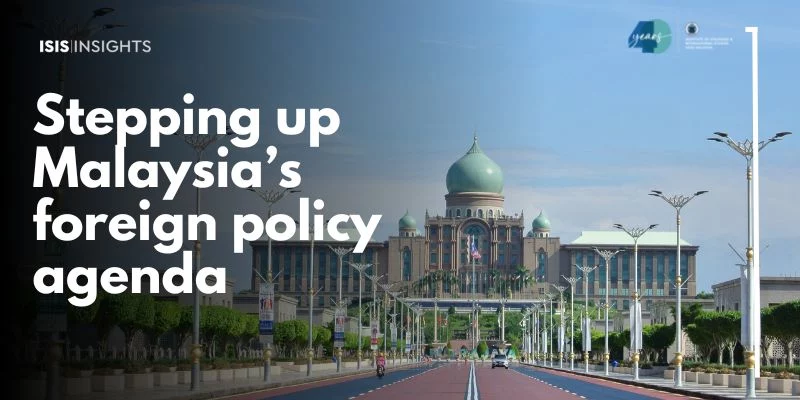New govt should engage in Indo-Pacific, take stronger stance on geopolitical issues
ANWAR Ibrahim’s appointment as prime minister last November made headlines across the world, with positive coverage, ranging from Nikkei Asia to New York Times.
To some in Malaysia, Anwar’s leadership symbolises a new era of rule of law. Abroad, he embodies the hope of a statesman that can manage the challenges of evolving geopolitical dynamics, a pivotal issue that his predecessors ignored.
The new government has its hands full with domestic issues, such as increasing cost of living, while other policy areas remain underdeveloped, especially foreign policy.
New Foreign Minister Datuk Seri Dr Zambry Abd Kadir has assured that Malaysia will maintain the main principles of its foreign policy but has refrained from commenting on issues before consulting the prime minister.
In the past, Malaysia’s foreign policy has been personality driven, usually by the prime minister. The Look East Policy is closely associated with Tun Dr Mahathir Mohamad, while China’s Belt and Road Initiative projects are linked to Datuk Seri Najib Razak’s tenure.
Zambry’s statement suggests that the same may be true for Anwar. But what could Anwar’s foreign policy look like?
Principles of non-alignment and cooperation will continue guiding Malaysia’s foreign policy. This means that Malaysia will not align to one major power and risk being entangled in great power rivalries but instead uphold friendly and cooperative relations with all partners.
There are expectations that the Anwar government will be more proactive on human rights, given how groups like Human Rights Watch and Amnesty International supported him during his detention and incarceration.
Human rights were identified as a principle in both the 2019 and 2021 foreign policy frameworks for Malaysia.
In 2021, Malaysia was elected to the UN’s Human Rights Council for the third time and promised to prioritise the rights of vulnerable groups, such as indigenous people. Zambry also recently emphasised the need to “address the plight of the Palestinians and Rohingya” but remained muted on the more controversial Uighur issue. In the past, Anwar has publicly expressed concerns over Uighur issues but his government will likely tread carefully on this while managing relations with China.
How Malaysia manages relations with China will be closely watched. In his maiden press conference, Anwar said it is important to balance relations between China, the United States, Europe, India and Asean. These all represent major stakeholders that have an interest in the Indo-Pacific, a region which has been gaining geostrategic significance.
The emergence of the Indo-Pacific concept has fundamentally changed Malaysia’s geostrategic environment. The various Indo-Pacific strategies unveiled by major powers have increased contestations in the region, which create both challenges and opportunities. In recent years, Putrajaya has adopted a cautious approach and fallen short in responding to geopolitical developments in a timely or meaningful manner.
Pursuing non-alignment is not an excuse for Putrajaya’s lack of a stance on geopolitical developments. If anything, pursuing non-alignment means Malaysia should be able to articulate clearly its stance and demonstrate an independent foreign policy. Failing to do so risks being marginalised as a bystander while great power rivalry engulfs the region that Malaysia calls home. Instead, Putrajaya should adopt a proactive foreign policy that is guided by principles and national interests, not personality.
The government should publish a foreign policy approach that articulates principles and priorities, and how it relates to present and future challenges. Existing frameworks can be a starting point, but they need to be reviewed in light of a rapidly changing geostrategic environment.
For a start, the new framework should at least acknowledge the Indo-Pacific region, something that was noticeably missing from the 2019 and 2021 frameworks. The prime minister’s comments during the press conference are an encouraging first glimpse of the potential Indo-Pacific outlook.
With every change of government there is hope for a better Malaysia, including in the international arena. Widely seen as a Muslim statesman, Anwar has the potential to bridge the West, Middle East and Asia in Malaysia’s foreign policy. He also could emphasise pragmatism on issues such as human rights.
Malaysia risks losing relevance if we do not exercise our voice. We have it, we must use it.
This article first appeared in the Malay Mail on 10 Jan 2023.





